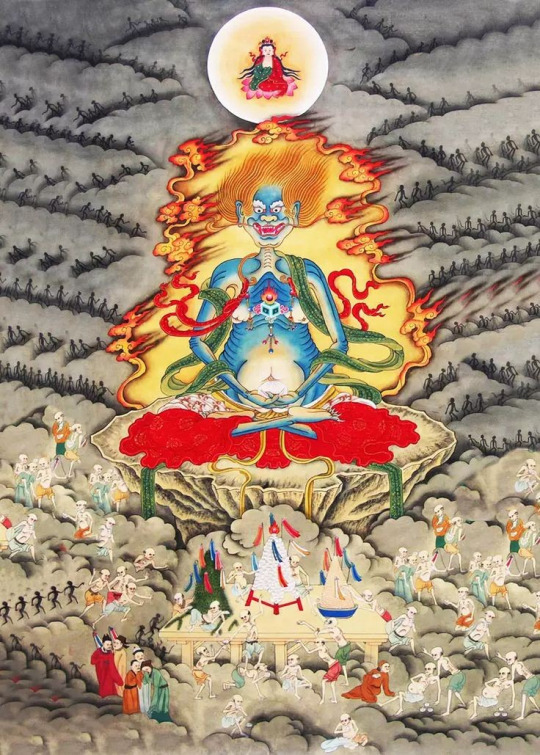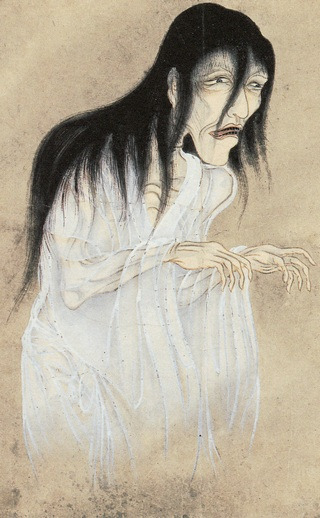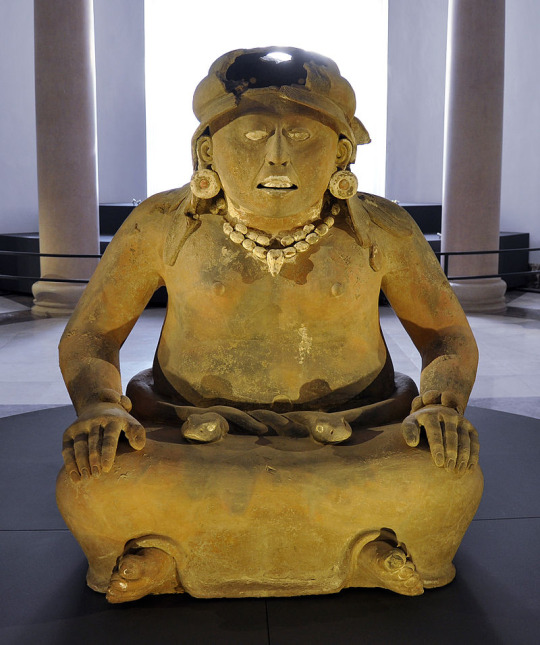#gidim
Explore tagged Tumblr posts
Text
Legendary Creatures: Ghosts
A belief in a spirit or soul that exists after a person or animal dies goes back as far as the written record and likely has origins in prehistory. Funerary practices seem to indicate a belief in the continuation of life by burying a person with objects that were used in daily life as well as practices like ritual feeding or clothing of ancestors. Since the belief in a continuation of some kind after death exists in so many cultures, we know that this belief goes far back in human history, perhaps even before modern humans expanded out of Africa. Many experts think that the awareness of mortality gave rise to a belief that some part of humans continues beyond death.
In cultures that didn't develop writing, or those whose written history was destroyed by colonizers, it's difficult to know what they believed about ghosts, spirits, or what happened to a person after death. We rely on more modern records by people who might view them as 'exotic' or might genuinely respect them and more recently by the people themselves. With that in mind, let us explore what we know about what people thought about ghosts in antiquity around the world.
Africa:
Among the Igbo people, man is both physical and spiritual in nature and the spiritual is eternal. The Akan see humans as having five parts, the Nipadua (body), Okra (soul), Sunsum (spirit), Ntoro (character from the father), and Mogya (character from the mother).

By Shyamal - Own work, Public Domain, https://commons.wikimedia.org/w/index.php?curid=5710972
The most well known in Africa is likely the Ancient Egyptian mythology because they wrote down their belief systems. They believed that a person was made of eight parts, the Khet (physical body), the Sah (spiritual body), Ren (name/identity), Ba (personality), Ka (double/vital essence), Ib (heart), Shuyet (shadow), Sekhem (power/form). The collective name for the spirit of a dead person once they entered the afterlife is the Akh. This idea was likely well developed early in the Old Kingdom (2700-2200 BCE). One of the ceremonies performed by priests after death, which was thought to happen when the Ka left the body, was to open a person's mouth to release the Ba to join the Ka, which creates the ꜣḫ (akh).
The afterlife was thought to be like the the mortal life but more resembling the journey of the Sun as it descended into Duat (underworld), meeting the mummified body of Osiris. Often, the mummified body was addressed as 'Osiris'. The ba, depicted as a featureless shadow as it left the body at dawn, would go about its work during the day and return to the body at night, as they believed the Sun returned to Osiris at night. Those who completed some form of quest or task were thought to become stars. The Book of the Dead, which was called the Book of Going Forth by Day by the Ancient Egyptians laid out how to avoid a second, permanent death. As written in the tomb of Nekhen of the Eighteenth Dynasty had written on his tomb as translated by James Peter Allen, American Egyptologist, 'Your life happening again, without your ba being kept away from your divine corpse, with your ba being together with the akh … You shall emerge each day and return each evening. A lamp will be lit for you in the night until the sunlight shines forth on your breast. You shall be told: "Welcome, welcome, into this your house of the living'.
During the Twentieth Dynasty (1189-1077 BCE), the idea of a roaming ghost, which could cause nightmares, guilt, or illness, began to be recorded. These arose when tombs weren't taken care of by prayers and offerings. The ghost could also be asked for benefits or to inflict punishments by making specific prayers and offerings.
As other areas of Africa didn't really have written records that we can decipher or find today, it's difficult to know what was the difference between gods and ghosts.
Mesopotamia:
Ghosts of the dead were known as gidim (𒄇) in Sumer, which became eṭemmu in Akkad. This word means something like gig (to be sick) and dim (a demon) or maybe gi (black) and dim (to approach). Sumerian is an agglutinative language, so different syllables can mean different things and were written differently and could be written differently when they were joined together and their endings were changed.

By Gennadii Saus i Segura - Own work, CC BY-SA 4.0, https://commons.wikimedia.org/w/index.php?curid=126738193
The memory and personality of the person went into the gidim, which was created at the death of the person, which then went to the Irkalla, the underworld and realm of Ereshkigal (𒀭𒊩𒌆𒆠𒃲), 'Queen of the Great Earth', goddess of the underworld with her husband Nergal (𒀭𒄊𒀕𒃲). To reach Irkalla and Anunnaki (𒀭𒀀𒉣𒈾), the gods of judgment who gave the laws of the dead and assigned fates to the dead. In addition to this, the sun god Utu would visit the neatherworld nightly and punish those who harassed the living and share offerings with the forgotten.
Offerings to dead relatives of food and drink by surviving family was said to comfort the dead. The forgotten would suffer and be able to cause physical and mental illnesses on their relatives who don't remember them if there are relatives that remain. Those who died in ways that their body was unrecoverable would have no ghost.
China:

By Unknown artist, Ming Dynasty - http://www.鹿山會館.tw/EastCapital/viewthread.php?tid=419&sid=ZzXrihhttp://www.shanximuseum.com/collect/topic/shuiluhua.html, Public Domain, https://commons.wikimedia.org/w/index.php?curid=138953197
Among the Chinese, with the widespread culture of ancestor worship, they believed that ancestors could be reached through a medium for aid in many areas of life. The still celebrated Hungry Ghost Festival (Zhongyuan Festival in Taoism, Yulanpen Festival in Buddhism) is also a part of ancestor worship as it's believed that on the day of the festival, spirits are able to cross from the underworld to the mortal world. Ghosts in Chinese cultures have many terms, generally related to guǐ (鬼 in Mandarin) such as guilao (鬼佬) for a ghost man, which is used as a pejorative for foreigners. Even nightmare (魇 yǎn) is related to the idea of ghosts.
Part of the belief encompassed in ancestor worship is the concept of the spirit being comprised of yin and yang, which was called hun (魂) and po (魄). Po, the yin component, is related to the grave and hun, the yang component, is related to ancestral tablet. When the person dies, the spirit divides into three, the po component remaining with the grave, the hun component going to the ancestral tablet, and the third component goes to judgment. The hun and po components can only survive as long as they are remembered and nourished. Eventually, the hun and po move on to the underworld, a neutral place, though the hun visits heaven first. Chinese ghosts are able to affect the mortal world, even to the point of murdered people could exact revenge on those who killed them.
Taoism became the majority religion during the Han dynasty (206 BCE- 220 CE) and Buddhism during the Tang Dynasty (681-197 CE). For a long time, these two belief systems were accepted together, syncretism (the mingling of beliefs) leading to a more complex system of beliefs with the ancestor worship of Taoism and traditional Chinese religion blending together with the belief in reincarnation found in Buddhism to create something unique with ten types of ghosts, one of which, the hungry ghosts (饿鬼, èguǐ), can be further divided into nine types.
Mediums were called mun mai poh (simplified 問米, traditional 問覡) which means 'ask rice woman' and is a pun for 'spirit medium' with different inflections. because the people coming to her would bring a cup of rice from their home so the ghosts could find and identify their family members. The medium helps to find out what the ancestor needs for the family's request (winning the lottery or getting into government housing). These needs are then burnt as paper effigies.
Japan:

By Sawaki Suushi (佐脇嵩之, Japanese, *1707, †1772) - scanned from ISBN 4-3360-4187-3., Public Domain, https://commons.wikimedia.org/w/index.php?curid=5510196
Japan's concept of a spirit or a soul is called a reikan (霊魂) that enters a holding place until they recieve a proper funeral and funerary rites so they can then join their ancestors. Those who are murdered, die of suicide, don't have a proper burial, or are consumed by revenge, love, jealousy, hatred, or sorrow, the reikan becomes a yuurei (幽霊 meaning faint or dim soul or spirit), which can interact with the physical world if they are fueled by strong enough emotion. These spirits remain until proper rites are performed for them or they are able to resolve their emotional issue. The yuurei tend to haunt only at the 'midtime of the hours of the Ox', which is 2:00-2:30am and tend to be bound to certain locations.
Another type of ghost, one who had stronger emotions and are capable to causing physical harm in the mortal world, is the onryou (怨霊) which means 'vengeful spirit' (alternately wrathful, hatred, resentful, ruthless, envious, dark, fallen, or downcast). There are three notable people who became onryou so revered that they became known as the Three Great Onryou of Japan (日本三大怨霊), Emperor Sutoku (July 7,1119-September 14,1164), Taira no Masakado (early 900s-March 25, 940), and Sugawara no Michizane (August 1, 845-March 26, 903) who reportedly caused a lot of death and destruction after their deaths because of the resentment and anger they died with. They were elevated to kami (gods) and a Shinto shrine in an effort to appease them.
India:

By Roboture - Own work, CC BY-SA 3.0, https://commons.wikimedia.org/w/index.php?curid=18747046
In India, the Sanscrit word bhoota (भूत) usually referred a to the ghost of a deceased person. Exactly what they are, though, varies by region, community, and time period. They are usually seen as those who were too hung up on something that keeps them from moving on through to the next phase in existence, which also varies by tradition. The belief in bhootas is an important and deeply ingrained part of the culture of the Indian subcontinent
Bhootas avoid touching the earth because the earth is held to be either sacred or semi-sacred, have feet that face backwards, are able to shape-shift though they tend to be human shaped most of the time, cast no shadows, and speak with a 'nasal twang'. There are some bhoota that haunt houses, which then become 'bhoot bangalas' (bhoot bungalows), usually where they died or are emotionally attached to. Stories with bhootas in them tend to select the traits to create the most suspense. Bhootas are capable of haunting milk, to the point of seeking it out. If someone drinks that milk, they can become possessed, which is another frequently used trope in the stories.
To protect themselves, people could use water, iron, or steel at hand since bhoota fear these things, as well as the scent of brunt tumeric, the fibers of an herb called bhutkeshi (bhoota's hair), holy figures, and the sprinkling of dirt.
Kingdom of Israel and Judah and diaspora:

By Ephraim Moses Lilien (1874–1925) - Book of Job, appearing in Die Bucher Der Bibel, Public Domain, https://commons.wikimedia.org/w/index.php?curid=19447366
In the Hebrew Bible, there is a type of ghost called the owb (או��ב) that's mentioned a few places. It relates to both mediums, with their connection to the dead and necromancy, such as when King Saul consults with the Witch of Endor to summon the spirt of Samuel, the prophet. Other places, it relates to shades, the spirits of those in the underworld.
In Jewish mythology and folklore, there is another type of ghost, that called in Yiddish a dybbuk (דיבוק), which comes from the Hebrew verb dāḇaq (דָּבַק), which means 'to cling' or 'to adhere'. These spirits are believed able to possess someone and to be the soul of a dead person. This type of ghost is first written of in the 16th century. The mezuzah (מְזוּזָה a specially inscribed parchment kept at doorways) is supposed to protect against dybbuk, a well hung one actually preventing a dybbuk from forming.
Greece:

By Eumenides Painter - User:Bibi Saint-Pol, own work, 2007-07-21, Public Domain, https://commons.wikimedia.org/w/index.php?curid=2453109
The ancient Greeks viewed ghosts 'as a vapor, gibbering and whining into the earth' as Homer wrote in the Odyssey and Iliad in the 8th century BCE. By the 5th century BCE, in classical Greece, ghost became something that could haunt people or places, for either good or ill, and were capable of interacting with the mortal world. They also performed ceremonies and sacrifices, including the pouring out of drinks, to make sure the spirits of the dead, which they viewed as shades, would not return to haunt their families. Shades (σκιά) were usually the spirit of the dead in the underworld and could be speak through oracles and could have divinity confirmed on them, like the Oracle of Ammon did to Hephastion, 'by far the dearest of all the king's friends' when Alexander the Great was 'inconsolable' after he died.
Rome:

By Henry Justice Ford - http://www.postershowcase.info/i1862812.html, Public Domain, https://commons.wikimedia.org/w/index.php?curid=11733112
Ancient Romans saw ghosts as a method of revenge by way of a curse being written on pottery or lead placed in a grave. They believed that ghosts could haunt locations, such as when Pliny the Younger wrote around 50 CE about the Stoic Athenodorus (who lived 100 years earlier) renting a house in Athens that was haunted. He deliberately sat up writing late. He saw a ghost wrapped in chains, which he then followed outside until the ghost pointed out a particular site. Athenodorus excavated the location and found a skeleton bound in chains. Once the skeleton was buried properly, the haunting ended.
One of the first skeptics to write their lack of belief was Lucian of Samosata, who wrote in the 2nd century CE. He wrote about Democritus (who lived about three hundred years earlier) lived outside the city of Abdera in Thrace deliberately to prove that ghosts didn't exist, even in the face of practical jokes, such as the young men of the city dressing up in 'black robes with skull masks'.
Central America:

By Vassil - Own work, CC0, https://commons.wikimedia.org/w/index.php?curid=17841631
Aztecs believed that after death the soul moved on to one of three places, Tlālōcān (a Paradise reigned over by the rain deity Tlāloc), Mictlān (where the dead travel with Xolotl through nine levels, passing several challenges) and the Sun. Fallen warriors and women who died in childbirth became hummingbirds.
The Maya believed in a pair of collective ancestors, the '(grand)fathers and (grand)mothers' which inhabited particular mountains where offerings were meant to be given.
The Purépecha believed that monarch butterflies symbolized the movements of the dead to their afterlife as they migrated to their winter habitat in what is now Michoacán, near where they lived. Theyalso had a story of the ghosts of a princess Mintzita and her fiancé go to a particular cemetary every Noche de Muertos as the Spanish called it. On that night, now, people float candles on Lake Pátzcuaro as well as others. Michoacán is even now called el alma de Mexicho (the soul of Mexico).
#ghosts#ghost#ancient egypt#igbo#afterlife#akh#gidim#gui#guilao#reikan#yuurei#onryou#bhoota#owb#dybbuk#shades#ancestor worship#legendary creature
4 notes
·
View notes
Text
Today marks the 5 year anniversary of Rings of Saturn’s Gidim. This would be the “aliencore” band’s last album with vocalist Ian Bearer, marking their transition to a fully instrumental band, to the disappointment of many fans.

1 note
·
View note
Text
Saat 14.30 daki fitness mi yoksa 18.00 daki fitness mi emin olamiyourz✍️🏻
7 notes
·
View notes
Text
radyocu tayfa kayıp bu gece, işaretleyip gelmemeniz kırıcı dfjgsldghjgfd
49 notes
·
View notes
Text
Kızı pişman ettim muhtemelen söylediğine yaa kfpdmfğem uf
#arkadaşımla aynı anda aynı güncel diziyi izliyomuşuz ben bıdı bıdı konuşurken o da ben de onu izliyorum dedi demez olaydı kfşdmfşs#ben kendimi tutup bölümleri izlemesem bile keşfetten koşup gidip izliyorum meraktan çatladığım için spoiler yiyyip ona anlatmaya çalışıyorum#o da kibar kibar bana bi anda öğrenmek istediğini önceden bilmek istemediğini anlatıyo kcşdkfl#ben de sonra diziyi izlerkenki tepkilerimi videoya çekip atıyorum 👉👈😌 umrumda değil asla kfpdkfşd#şu an tutuyorum kendimi bana yetişsin diye ona da üzülüyorum çünkü ya yazık kfldkfl gidim de yeni gelen bölümde noluyomjş öğreneyim bari
2 notes
·
View notes
Text
youtube
DIGIR GIDIM-III
#DIGIR GIDIM#BLACK METAL#HEAVY METAL;#METAL;#THE CELESTIAL MACROCOSMIC SCALE AND THE SHIMMERING OF THE SUPREME REGULATOR#2022#Youtube
1 note
·
View note
Text
yaw anasini satim ne guzel uyuyordum bir yandan anam bagirarak konustu (kardesim sus yeliz uyuyor diyince aman uf uyansin banane dedi?!) sonra da misafir gelmis bagirarak konusuyor(ki ona da yeliz uyuyor demisler) YAW SİZ BENİ DELİRTMEYE Mİ CALSİİYORSUNUZ OLDURURM HEPİNİZİ KATİL OLURUM HE
#sonra el birligiyle uyandirdilar misagor gelmis ahah kizi da uyandirdik dur ben gidim dedid siktir olup gitti#annem de utanmadan gelmis sirinlik yapiyor benimle konusmaya calsiiyor#bogcam hepsini simdi katil olcam
0 notes
Text
sabahin korunde zorla yataktan cikmisim hazirlanmisim beni ariyo diyo gelemicem...neyse sakinimmm
1 note
·
View note
Text
ay cidden benim bu ara agzim asiri bozuldu ya
#evd rahatsiz oluyorum ama olmuyorum da#sinirlenince kufur ediyorm hop kufr cok komik oldugu icin sinir gidiyo#ama bira azaltmam lazim???#evd.#daha az konusursam daha az kufrederim dicem de ben icimden de cok sovuyorum amk#mesela suan konusmuyom#ama kufrediyorum#O ZAMAN İCİMDEN DE SUSAYİM?????#MEGAMİND#gidim az daha uyim
1 note
·
View note
Text
Nişanlımın, Yengesi
Ben Can yaş 25 , bu sene nisanlandim , nişanlım abisinin hanımı ( yengesi ) ile çok iyi anlaşır, bu vesile ile bizde sık sık görüşürüz, bi ara nişanlımla bazi konularda biraz gerildik , bi türlü ortak noktada bulusamaz olmustuk , devreye yenge girdi o süreçte çok daha uzun konuşur, mesajlasir olduk , yenge bu böyle olmayacak bi buluşalım yüz yüze konusalim sonrada meltem i de alir hep beraber konusuruz demişti, bu arada yenge 35 yaşında, arabayla aldim yengeyi konusarak ilerliyoruz , nereye gidim dedim cafeye flan mi , yok sakin bi yere git arabada konusuruz , senin stresin yuksek bu ara celallenirsin falan kafede , hem rahat konusamayiz dedi , sahil kisminaa dogru tenha sakin olan bi yere gectim arabada konusuyoruz , neden bu gerginliginiz falan diye konusurken , yok öyle yok boyle konusurken , yenge dedi ki , siz sevismiyormusunuz , ben bi duruldum , sevisin oynasin biraz nisanlisiniz evleniceksiniz , dugun oncesi olur boyle gerginlikler bir birinize temas ediceksiniz ki stresiniz qzalsin dedi , meltem kaciyor benden pek yaklasmami istemiyor dedim , ne diyor peki diye sordu , kendimize engel olamayiz fazla ileri gideriz diyor hep , bende gitsek nolacak zaten evleniyoruz ne kaldi şunun surasi diyorum dedim , o ara yenge yapıştı dudaklarima , erkeksin istican tabi vermiyorsada verene yanasican ozaman dedi ben sastim kaldim , arabayi clistirip ormanlik binalana cektim , yengeyi bi güzel sikip rahatlamistim , şimdi arayalim mi artik meltem i duzeltelim mi aranizi dedi , sen böyle hep bize destek olacaksan neden olmasin dedim , ağzın sıkı olduğu sürece benden sana tam destek dedi , .....
81 notes
·
View notes
Text
Erkeklerde ağlarmış
Ölmede sürün #kızılcık serbeti#fatik#
Keser döner sap döner fatik
Gün gelir hesap döner
Kimse yaşattığını yaşamadan ölmez
Ey gidim heyy
130 notes
·
View notes
Text
Neyse ben gidim asla ultra xx mega gerçek olmayan şirketteki birbiriyle atışan çiftin olduğu türk dizimi izliyim
33 notes
·
View notes
Text

Ben yeniden kişilik testi yaptımm bu kadar ben olamaz abi kopyala yapıştır yapmışlar sokum
9 notes
·
View notes
Text
DÜNYANIN EN KOMİK VİDEOSU GALERİMDEYMİŞ UNUTMUŞUM İZLEMEYİ GECE GECE GÜLMEKTEN ALTIMA EDİCEM ŞİMDİ SERRA BU NEEEEĞĞĞĞ
#Allah kahretmesin yaa keşke telefonun kamerası azcık minicik daha sağa çevrili olsaymış o zaman her şey hd izlenirmiş de neyse bu da çok iyi#gözümden yaş geldi yeminle yaaa oouuffffff vlşdkgğdk#gidim bi daha izliyim#videoda doğaçlama bi şekilde serrayla dövüşüyoruz bu arada söylemeyi unuttum#🤠🤠
2 notes
·
View notes
Text
youtube
DIGIR GIDIM-CONVERSING WITH THE ETHEREAL
#DIGIR GIDIM#BLACK METAL#HEAVY METAL#METAL#I THOUGHT THERE WAS THE SUN AWAITING MY AWAKENING#2017#Youtube
0 notes
Text
Fal baktırmaya gidim diyorum kızılaya allahım affet ama merak saldı
7 notes
·
View notes